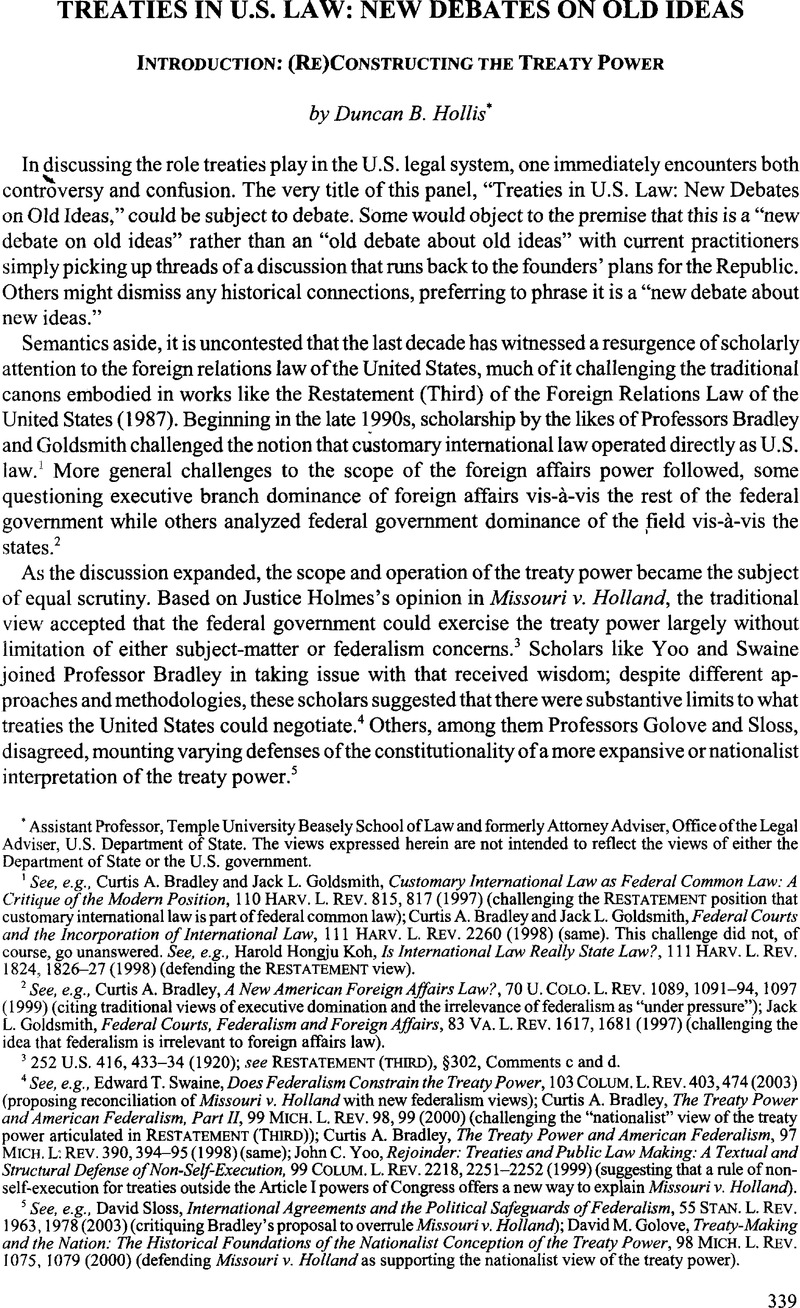No CrossRef data available.
Article contents
Introduction: (Re)Constructing the Treaty Power
Published online by Cambridge University Press: 28 February 2017
Abstract

- Type
- Treaties in U.S. Law: New Debates on Old Ideas
- Information
- Copyright
- Copyright © American Society of International Law 2004
References
1 See, e.g., Bradley, Curtis A. and Goldsmith, Jack L., Customary International Law as Federal Common Law: A Critique of the Modern Position, 110 Harv. L. Rev. 815, 817 (1997)CrossRefGoogle Scholar (challenging the Restatement position that customary international law is part of federal common law); Bradley, Curtis A. and Goldsmith, Jack L., Federal Courts and the Incorporation of International Law, 111 Harv. L. Rev. 2260 (1998)CrossRefGoogle Scholar (same). This challenge did not, of course, go unanswered. See, e.g., Koh, Harold Hongju, Is International Law Really State Law?, 111 Harv. L. Rev. 1824, 1826-27 (1998)CrossRefGoogle Scholar (defending the Restatement view).
2 See, e.g., Bradley, Curtis A., A New American Foreign Affairs Law?, 70 U. Colo. L. Rev. 1089, 1091-94, 1097 (1999)Google Scholar (citing traditional views of executive domination and the irrelevance of federalism as “under pressure”); Goldsmith, Jack L., Federal Courts, Federalism and Foreign Affairs, 83 Va. L. Rev. 1617, 1681 (1997)CrossRefGoogle Scholar (challenging the idea that federalism is irrelevant to foreign affairs law).
3 252 U.S. 416, 433-34 (1920); see Restatement (Third), §302, Comments с and d.
4 See, e.g., Swaine, Edward T., Does Federalism Constrain the Treaty Power, 103 Colum. L. Rev. 403, 474 (2003)CrossRefGoogle Scholar (proposing reconciliation of Missouri v. Holland with new federalism views); Bradley, Curtis A., The Treaty Power and American Federalism, Part II, 99 Mich. L. Rev. 98, 99 (2000)CrossRefGoogle Scholar (challenging the “nationalist” view of the treaty power articulated in Restatement (Third)); Bradley, Curtis A., The Treaty Power and American Federalism, 97 Mich. L. Rev. 390, 394-95 (1998)CrossRefGoogle Scholar (same); Yoo, John C., Rejoinder: Treaties and Public Law Making: A Textual and Structural Defense of Non-Self-Execution, 99 Colum. L. Rev. 2218, 2251-2252 (1999)CrossRefGoogle Scholar (suggesting that a rale of non-self-execution for treaties outside the Article I powers of Congress offers a new way to explain Missouri v. Holland).
5 See, e.g., Sloss, David, International Agreements and the Political Safeguards of Federalism, 55 Stan. L. Rev. 1963, 1978 (2003)Google Scholar (critiquing Bradley’s proposal to overrule Missouri v. Holland); Golove, David M., Treaty-Making and the Nation: The Historical Foundations of the Nationalist Conception of the Treaty Power, 98 Mich. L. Rev. 1075, 1079 (2000)CrossRefGoogle Scholar (defending Missouri v. Holland as supporting the nationalist view of the treaty power).
6 Damrosch, Lori Fisier, “Sovereignty” and International Organizations, 3 U. C. Davis J. Int’l L. & Pol’y 159, 161 (1997)Google Scholar (further study needed to elaborate an adequate theory of the relationship between international organizations and the U.S. Constitution).
7 See, e.g., Swaine, supra note 4, at 423-33 (raising issue of applying anti-commandeering to treaty affairs); Flaherty, Martin S., Part II: Are We to Be a Nation? Federal Power vs. ‘States Rights’ in Foreign Affairs, 70 U. Colo. L. Rev. 1277, 1279-80 (1999)Google Scholar (arguing the federal foreign affairs power trumps the anti-commandeering principle).
8 Bradley, Curtis A., International Delegations, the Structural Constitution and Non-Self-Execution, 55 Stan. L. Rev. 1557 (2003)Google Scholar (considering the constitutional implications of U.S. delegations of authority to international institutions); Ku, Julian G., The Delegation of Federal Power to International Organizations: New Problems with Old Solutions, 85 Minn. L. Rev. 71 (2000)Google Scholar (same); Golove, David, The New Confederalism: Treaty Delegations of Legislative, Executive, and Judicial Authority, 55 Stan. L. Rev. 1697 (2003)Google Scholar (examining the delegation issue with reference to early U.S. experiences).
9 United States v. Postal, 589 F.2d 862, 876 (5th Cir.), cert. denied 444 U.S. 832 (1979). Postal itself did little to clear up the confusion.
10 See, e.g., Yoo, John C., Globalism and the Constitution: Treaties, Non-Self-Execution, and the Original Understanding, 99 Colum. L. Rev. 1955, 2093 (1999)CrossRefGoogle Scholar (favoring a presumption that U.S. treaty commitments are non-self-executing); Vazquez, Carlos Manuel, Laughing at Treaties, 99 Colum. L. Rev. 2154 (1999)CrossRefGoogle Scholar (rejecting Yoo’s arguments).




